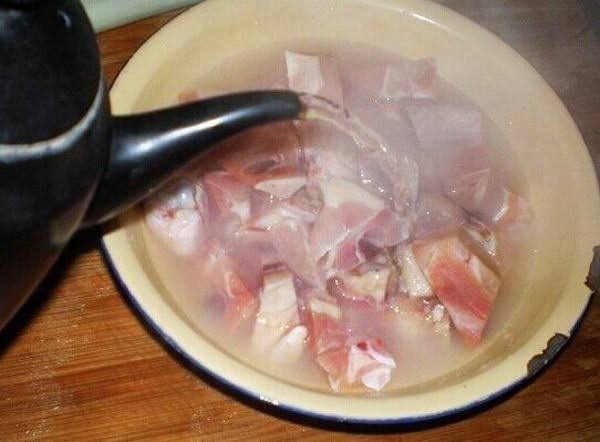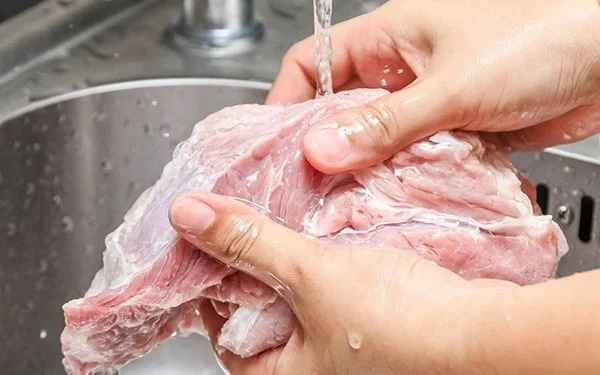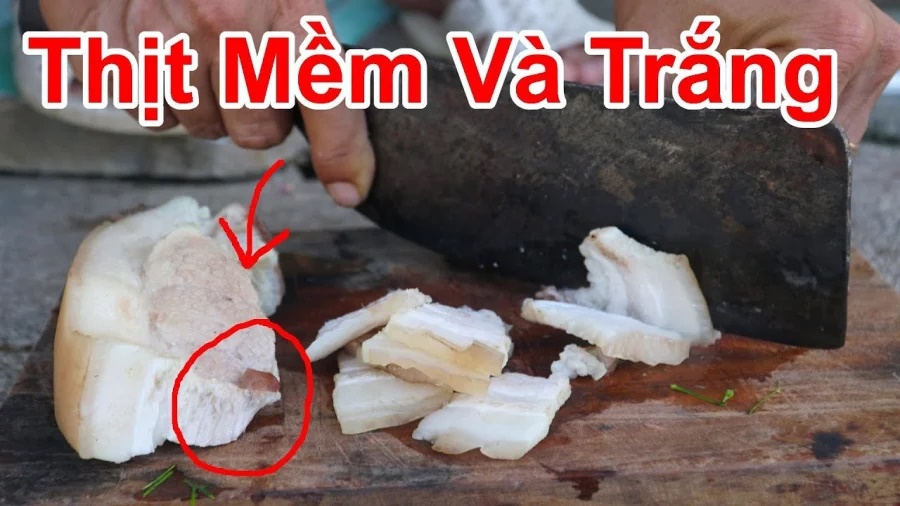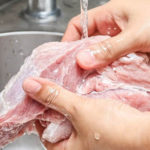1. Should you blanch meat in boiling water before cooking?
To have delicious and safe meals, housewives are very concerned about choosing clean and delicious food. Many people suggest blanching pork in boiling water before cooking to remove harmful substances. Boiling water at high temperature will help eliminate viruses, harmful bacteria… But the truth is that it does not remove toxins and dirt from the meat, and it also has negative effects on the health of the consumer.

According to Prof. Nguyen Duy Thinh, former lecturer at the Hanoi University of Technology, blanching meat in boiling water is a very common mistake made by many housewives. Putting the meat in boiling water will cause the meat to shrink. At high temperature, the surface proteins of the meat contract, and the dirt or harmful substances inside do not escape.
Therefore, you should only use boiling water to sterilize. If the meat is unfortunately contaminated, it can be treated by boiling it thoroughly, then the bacteria will die and the meat will become safer.
Instead of blanching the meat in boiling water, if you want to remove dirt and chemicals from pork, the best way is to wash it with clean water multiple times after buying it. In addition, you can use salt or diluted salt water to knead the meat, then rinse it with clean water.
Alternatively, you can soak the meat or bones in rice water for about 1 hour. This method is very effective in removing dirt from the surface of the ribs, excess blood in the meat and bone, reducing the fishy smell, and making the food more delicious.
You can also put the bones or meat in a bowl of water with a little white vinegar, soak for about 15 minutes, then scoop it out and rinse it clean before cooking. Vinegar softens the meat and removes excess blood from the meat.
2. How to properly wash pork to remove dirt
Wash pork with diluted salt water
Washing pork with diluted salt water is considered the standard way to clean pork. It can remove dirt from the inside.
You just need to dissolve a basin of warm diluted salt water and soak the meat for about 10 – 15 minutes. At this time, the dirt inside will slowly be released. Then you rinse the meat again with water and put the meat in cold water to slowly boil. This will push the impurities inside out.
During the boiling process, if you see more and more foam on the surface of the meat broth, it means that more impurities are being cleaned.

Soaking pork in rice water
After washing rice, keep the rice water and soak the meat in it. Rice water contains a lot of starch and amycolite – a substance used to clean food that can remove impurities in pork. You should wash the meat before soaking it in rice water.
Soak the meat for about 20 minutes and you will see a lot of impurities floating on the surface of the rice water. At this time, the bacteria and dirt have been pushed out.
You should rinse the pork again with water to remove any remaining dirt on the surface of the meat.
Then use a piece of lime to rub the entire surface of the meat for about 2-3 minutes, then rinse it with water.
Washing pork with vinegar
This method of washing pork is similar to soaking pork in rice water. The only difference is that this method uses vinegar instead of lime.
You prepare a clean bowl, add a little salt and white vinegar to it, and then rub it directly on the pork. Do this for about 10 minutes. At this time, the dirt and blood in the pork will be released and completely cleaned.
These 3 methods of cleaning pork are very easy to do, so any housewife can do it. However, there is one method that is faster than all the others and can easily clean pork and pork ribs.
3. Should you boil meat in boiling water or cold water?
Many people have the habit of boiling meat in cold water, but some people boil meat in hot water. So which method is the tastiest and most beneficial for health?

Meat boiled in boiling water will be sweeter than meat boiled in cold water. Because the meat retains its nutrients and is not degraded by boiling for too long. Boiling meat in cold water may not make the meat as tasty as boiling meat, but the meat broth is sweet and flavorful because the nutrients have been released into the water. It can be used to cook soup.
Therefore, choose the method of boiling meat according to your needs. During the cooking process, if you see foam on the surface, use a spoon to remove it.
To make the meat delicious and avoid the fishy smell, you can add dried onions or a little lemongrass when cooking.
According to Giaitri.thoibaovhnt





































